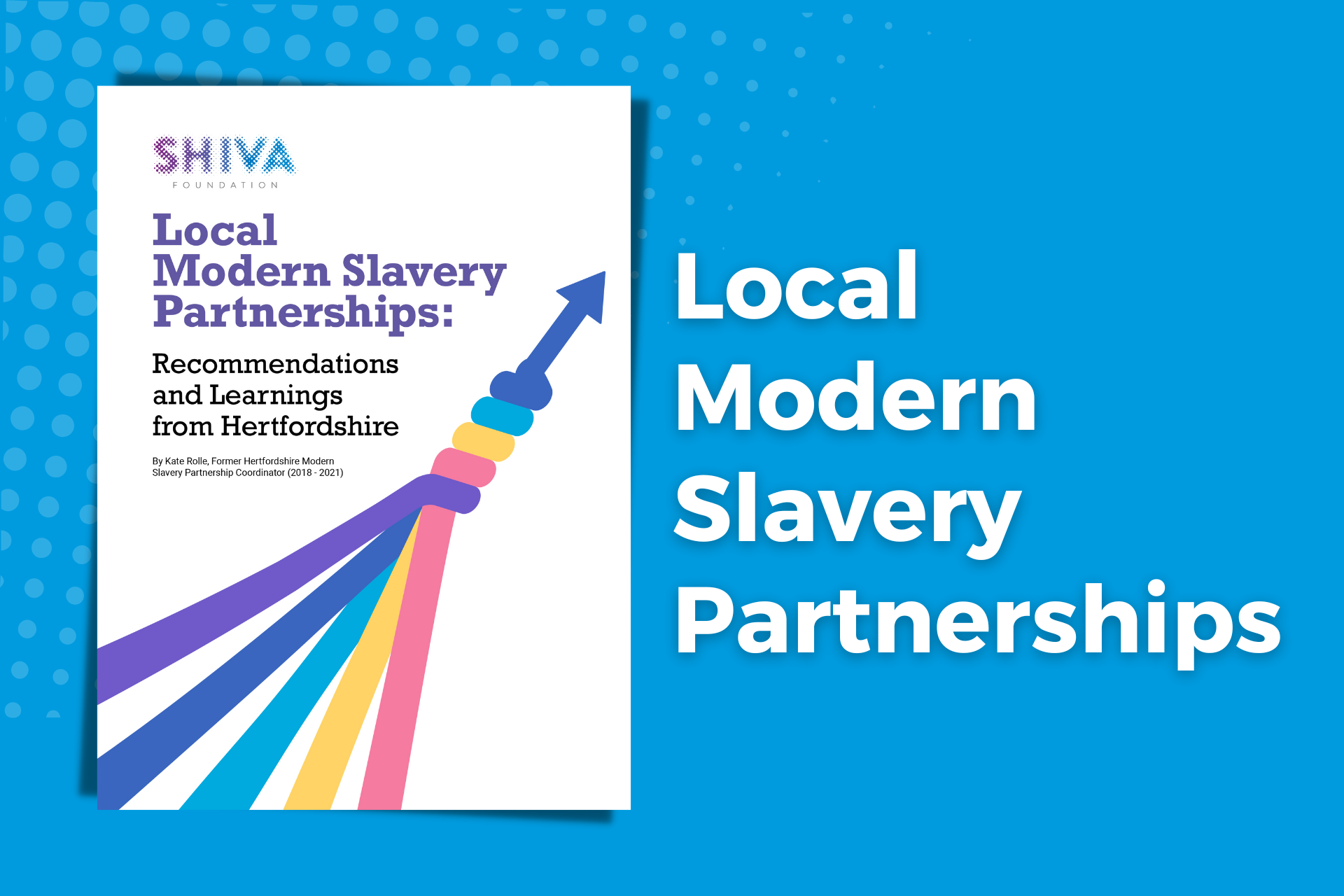Report
Local Modern Slavery Partnerships: Recommendations and Learnings from Hertfordshire

9 February 2022
Today Shiva Foundation is publishing a report setting out explicit recommendations for how anti-slavery partnerships across the country, often recognised for their importance, can be more sustainable, more effective and more consistent with the help of national guidance. This report, Local Modern Slavery Partnerships: Recommendations and Learnings from Hertfordshire, has been written from the perspective of having set up and coordinated an anti-slavery partnership in Hertfordshire for over four years.
In March 2017, Shiva Foundation along with the Police and Crime Commissioner for Hertfordshire, the Hertfordshire Constabulary and Hertfordshire County Council, organised an event for over 250 stakeholders across the country; the aim was to raise awareness of modern slavery, its prevalence in the community and how we could work together to better identify and support victims while prosecuting more criminals. There was an overwhelming agreement that a multi-agency partnership was part of the solution.
A few months later the Hertfordshire Modern Slavery Partnership had its first meeting and Shiva Foundation became the Coordinator until July 2021. The partnership now includes 152 members, 337 victims have been identified and 238 modern slavery offences have been recorded, 105 organisations have been trained and 37 resources have been produced to help with identifying and reporting. Anti-slavery partnerships have grown to cover 43 of the 45 police force areas and they are rightly praised for the important work they do. We wanted to reflect on our years as coordinator and share the lessons we’ve learned.
The report highlights what we have identified as fundamental elements of an anti-slavery partnership, pointing to best practice around the country:
- Defined multi-agency pathways and processes
- Senior Leadership buy-in, governance and accountability
- Capacity and engagement
- Training, expertise and reporting
- Funding
- Coordination
- Consistent, clear and up-to-date messaging
- Data recording: national and local datasets
We hope that not only can this report be of help to other areas or those looking to establish their own multi-agency partnership to address modern slavery, but also to put forward recommendations to help each of the elements thrive. Recommendations include:
- Anti-slavery partnership working should be a statutory duty for key organisations.
- Ring-fenced funding should be available to those fulfilling the aforementioned statutory duty and should be grounded in a national framework for accountability.
- Local partnership coordinators should be funded sustainably through a national framework to develop anti-slavery work and consistently monitor performance.
- There should be consistency about where the coordinator role sits, and responsibilities should be clear and draw across a variety of overlapping areas.
- A flag system for modern slavery indicators should be implemented across all government departments and statutory agencies.
Report
Local Modern Slavery Partnerships: Recommendations and Learnings from Hertfordshire

9 February 2022
Today Shiva Foundation is publishing a report setting out explicit recommendations for how anti-slavery partnerships across the country, often recognised for their importance, can be more sustainable, more effective and more consistent with the help of national guidance. This report, Local Modern Slavery Partnerships: Recommendations and Learnings from Hertfordshire, has been written from the perspective of having set up and coordinated an anti-slavery partnership in Hertfordshire for over four years.
In March 2017, Shiva Foundation along with the Police and Crime Commissioner for Hertfordshire, the Hertfordshire Constabulary and Hertfordshire County Council, organised an event for over 250 stakeholders across the country; the aim was to raise awareness of modern slavery, its prevalence in the community and how we could work together to better identify and support victims while prosecuting more criminals. There was an overwhelming agreement that a multi-agency partnership was part of the solution.
A few months later the Hertfordshire Modern Slavery Partnership had its first meeting and Shiva Foundation became the Coordinator until July 2021. The partnership now includes 152 members, 337 victims have been identified and 238 modern slavery offences have been recorded, 105 organisations have been trained and 37 resources have been produced to help with identifying and reporting. Anti-slavery partnerships have grown to cover 43 of the 45 police force areas and they are rightly praised for the important work they do. We wanted to reflect on our years as coordinator and share the lessons we’ve learned.
The report highlights what we have identified as fundamental elements of an anti-slavery partnership, pointing to best practice around the country:
- Defined multi-agency pathways and processes
- Senior Leadership buy-in, governance and accountability
- Capacity and engagement
- Training, expertise and reporting
- Funding
- Coordination
- Consistent, clear and up-to-date messaging
- Data recording: national and local datasets
We hope that not only can this report be of help to other areas or those looking to establish their own multi-agency partnership to address modern slavery, but also to put forward recommendations to help each of the elements thrive. Recommendations include:
- Anti-slavery partnership working should be a statutory duty for key organisations.
- Ring-fenced funding should be available to those fulfilling the aforementioned statutory duty and should be grounded in a national framework for accountability.
- Local partnership coordinators should be funded sustainably through a national framework to develop anti-slavery work and consistently monitor performance.
- There should be consistency about where the coordinator role sits, and responsibilities should be clear and draw across a variety of overlapping areas.
- A flag system for modern slavery indicators should be implemented across all government departments and statutory agencies.


